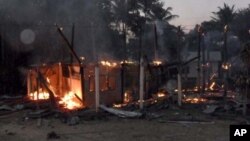A Thai sugar company with major shares in Cambodian sugar cane is being investigated for human rights violations in operations along the border between the two countries.
The National Human Rights Commission of Thailand recently investigated allegations that villagers were forced from their homes to make way for plantations of the three companies: Angkor Sugar, Tonle Sugar Cane, and Cane and Sugar Valley.
The three of them have lands totaling 20,000 hectares, all granted in 2008 with 70-year leases and used by Mitr Phol, Thailand’s leading producer and exporter of sugar, and its largest producer in Asia.
Speaking at a press conference in Phnom Penh Wednesday, Niran Pitakwatchara, head of the National Human Rights Commission of Thailand, said the commission began investigating the Mitr Phol in 2010.
Niran just completed a three-day visit to Cambodia, traveling to disputed sites in northern provinces to investigate allegations of abuse.
“We’re going to publish a report, and it will be handed over to relevant parties, such as the Thai government, the EU, and UN agencies in Thailand,” he said. Thailand has agreed to respect human rights, “so it’s important for investors to respect those principles,” he said.
Mitr Phol representatives could not be reached for comment. But its website says the company is serious about social responsibility.
Hoy Mai, a representative for villagers in Oddary Meanchey province, said more than 600 families and 10,000 hectares of farmland were affected by Mitr Phol operations that began in 2008. “The company seized our farmland and burned down our houses,” she said. “We tried to seek help from the authorities, but no one helped us.”
Teng Keo, who represents villagers in Koh Kong province, said in 2006 a Thai company ordered security forces and military police to burn people’s houses, evicting some 200 families. “I would beg for help from the government, because you’re the one who gave land concessions to companies,” he said. “Your development is now destroying our lives.”
Yeng Virak, executive director of the Community Legal Education Center, said he hoped the Thai rights commission would be able to put more pressure on Thai companies to respect human rights.
But Niran said he could not force change. “I’ll just write the report,” he said. “But in Thailand, any company will find themselves [in difficulty] if they have problems with the local community,” he said.




